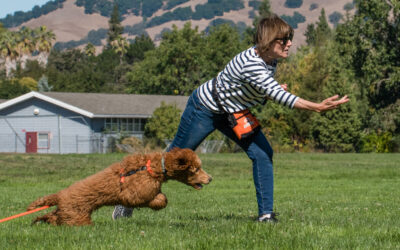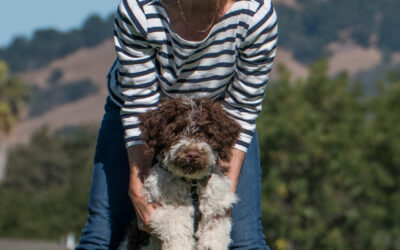Socialization is a bit more complicated than most people think. Rather, socializing a puppy means teaching him social skills, impulse control, and lessons in how to play with, greet, and interact with other puppies, dogs, and people. It’s a multi layered process.
Sibling Rivalry and Early Play
If your puppy is eight, nine, or 10 weeks old he probably spent his first 8 weeks with siblings. If you’ve ever seen sibling puppies interact with each other, you may be surprised at how brutal they can seem. Because siblings have such an intimate connection with each other it is difficult to teach them to interact politely with each other. This is why we recommend against adopting sibs. That sense of familiarity and competition remains throughout their life, making their relationship with each other so primary and all consuming that it is challenging for new owners to bond with and train each puppy.
Putting Aside Mock Battle in Favor of Social Skills
When puppies arrive in their new home from eight weeks onward the mock battle and rough play of babyhood must be shelved immediately. Should your puppy attempt to use his old moves of biting, scratching, pinning or leaping into a dog’s face he might well experience that dog’s displeasure in a form that he will not forget.
Puppies and Dogs – A Volatile Combination
The sad fact is, most adult dogs do not enjoy puppies. Imagine those teeth and nails coming at your face with all the force of a tiny tornado. Should an adult dog feel trapped on a leash or sense he has no options but to defend himself he may discipline your puppy. When this happens the outcome can be frightening, even dangerous.
First Encounters – Critical and Pivotal
Your puppy’s first encounter should take place in a controlled environment (a quiet room) with another puppy or dog you have complete control over. You’ll want to avoid dog parks. These are dangerous places for puppies. In fact, have a look at my dog parks blog post. I think you’ll find it enlightening.
Safe Puppy Introductions
Safe puppy introductions pave the way for all future contacts with dogs and can make the difference between a puppy that is fearful or lacks confidence, and one that knows how to conduct himself and stay safe.
I will have lots to share on first encounters and look forward to showing you how we introduce puppies in an upcoming post. I will also share videos that show you how to handle what may arise. HINT: I avoid puppy socials as they frequently turn chaotic and frightening for smaller or more tentative puppies. Explosive encounters can be counterproductive and it becomes difficult to teach puppies it’s not OK to roughhouse once they’ve experienced this type of, “play.”
And so, since play is the work of puppies, their play certainly needs work. This is one of the most important areas of raising and training a puppy. Your goal will be to control the environment and your puppy’s experience so you can shape your puppy’s interactions with others. Teach him to be polite, begin immediately to teach him impulse control, and you’ll have a puppy with beautiful manners.



